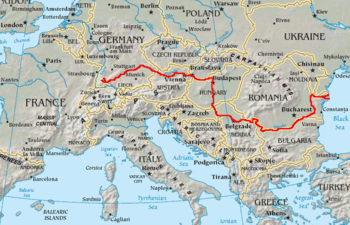Hron
| Hron | |
| River | |
 The Hron near Starý Tekov | |
| Country | Slovakia |
|---|---|
| Regions | Banská Bystrica, Nitra |
| Tributaries | |
| - left | Slatina |
| Source | Hron |
| - location | Kráľova hoľa near Telgárt, Low Tatras, Banská Bystrica Region |
| - elevation | 980 m (3,215 ft) |
| Mouth | Danube River |
| - location | Kamenica nad Hronom, Nitra Region |
| - elevation | 112 m (367 ft) |
| Length | 298 km (185 mi) |
| Basin | 5,453 km2 (2,105 sq mi) |
| Discharge | |
| - average | 53.7 m3/s (1,896 cu ft/s) |
| - max | 1,050 m3/s (37,080 cu ft/s) |
| - min | 7.6 m3/s (268 cu ft/s) |
| Progression | Danube→ Black Sea |
The Hron (Slovak: Hron, German: Gran, Hungarian: Garam, Latin: Granus) is a 298-kilometre (185 mi) long left tributary of the Danube and the second-longest river in Slovakia. It flows from its source in the Low Tatra Mountains (below Kráľova hoľa) through central and southern Slovakia, emptying into the Danube near Štúrovo and Esztergom. Major cities and towns on the Hron are Brezno, Banská Bystrica, Sliač, Zvolen, Žiar nad Hronom, Žarnovica, Nová Baňa, Tlmače, Levice, Želiezovce, and Štúrovo.
The river's basin covers approximately 11 percent of Slovakia's territory.
Etymology
The name is probably of Germanic origin; *Granahua: gran – spruce, ahua – water.[1]
History
The name of the river was mentioned for the first time in 170, when Roman Emperor Marcus Aurelius wrote his Meditations at the Hron (Latin: Granus) river.[2] The first recorded medieval name was Gron (1075).[2] From the 17th century until the 1930s, the river was used for wood transport.
References
| Wikimedia Commons has media related to Hron. |
Coordinates: 47°49′N 18°45′E / 47.817°N 18.750°E
